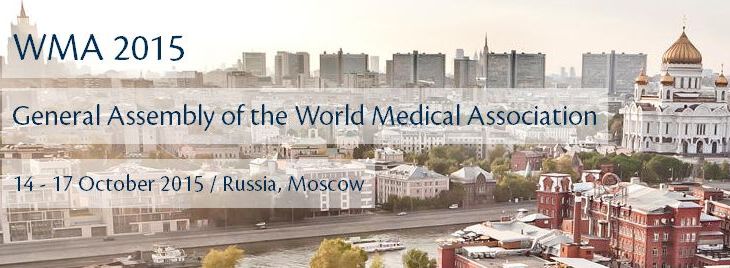
The annual General Assembly of
the World Medical Association representing 112 National Medical Associations
and constituent bodies was held at
the World Trade Center Moscow from 14 to 17 October 2015. The programme of the
meeting was as follows:
Wednesday 14 October: Committees
Thursday 15 October:
Scientific Session
Friday 16 October: Council
meeting
Assembly Ceremonial Session
Saturday 17 October:
General Assembly
The themes of the Scientific
Session were "Medical Education” and "Climate Changes". Renowned
speakers joined the scientific session including Professor David Gordon, President of
World Federation for Medical Education, Sir Michael Marmot, President-elect of
WMA, Dr. Robert Wah, Past President of the American Medical Association,
Professor Kenji Matsubara, and Vice President of the Japanese Medical
Association
At the Ceremonial Session, Sir
Michael Marmot, Professor of Epidemiology and Public Health at University
College London, was installed as President of the WMA for 2015/16
Among
the issues discussed were:
MOBILE
HEALTH: New regulations to protect patients who use mobile health devices were
adopted by the Assembly. These include devices, such as mobile phones, patient
monitoring devices, personal digital assistants and health promotional apps
used by people to log their calorie intake or daily activity. A new policy
document urges patients and physicians to be extremely careful when using
mobile health because of the potential risks and implications.
WELL-BEING:
The medical profession should do far more to prevent and deal with stress and
illness among physicians, delegates agreed. They adopted new guidance calling
for a series of measures to improve physicians’ wellbeing. Sir Michael Marmot,
President of the WMA, said: ’We are urging better wellness promotion,
prevention strategies and earlier intervention to help lessen the severity of
mental and physical illnesses and help reduce incidence of suicide among
physicians, physicians in training and medical students.’
DECLARATION
ON ALCOHOL: New legal and regulatory measures as well as social policy
interventions were called for to combat the problem of alcohol-related harm,
which the Assembly agreed had become a global health scourge. These included
the strengthening of health systems, increased alcohol prices, regulating
non-commercial alcohol, tightening the prohibition of selling to minors,
regulating alcohol marketing and limiting the role of the alcohol industry
in alcohol policy development.
NUCLEAR
WEAPONS: The Assembly approved a Statement condemning the development, testing,
production, stockpiling, transfer, deployment, threat and use of nuclear
weapons and requesting all governments to work in good faith towards their
elimination. The WMA Council heard that there were more than 16,000 nuclear
warheads held by nine countries, the vast majority by the United States and the
Russian Federation, and that the use of even only a small percentage of these
warheads would be a global catastrophe.
STREET
CHILDREN: Urgent action to tackle the global health problem of street children
was agreed. The Assembly adopted a statement declaring that child
maltreatment is a world health problem and that prevention, early
identification and comprehensive treatment of child abuse victims remain a
challenge for the world medical community.
PROMOTIONAL
MASS MEDIA APPEARANCES BY PHYSICIANS: Following serious concern over the
increase of physicians’ appearing on the mass media to recommend unproven
treatments or products, delegates agreed new guidelines. These are aimed at
contributing to patient safety by ensuring physicians provide accurate, timely,
and objective information and preventing physicians from being involved in
commercial activities that may compromise professional ethics.
MEDICAL
SCHOOL CURRICULA: The Assembly agreed that medical ethics and human rights
should be taught at every medical school as obligatory and examined parts of
the curriculum, and should continue at all stages of post graduate medical
education and continuing professional development. Delegates agreed that
failures of individual physicians to recognize the ethical obligations they owe
patients and communities can damage the reputation of doctors both locally and
globally. Therefore it is essential that all doctors are taught to understand
and respect medical ethics and human rights from the beginning of their medical
school careers.
VITAMIN
D INSUFFICIENCY: National medical associations were urged to support continued
research and education about vitamin D deficiency which effects about a
third of the population. The Assembly declared that this was an important
health issue globally with many studies showing that vitamin D deficiency
was linked to impaired growth and development. Because of widespread occurrence
of vitamin D deficiency it was important to focus attention on adequate
preventive actions in populations at risk, such as young children, the elderly
and pregnant women.
SOCIAL
DETERMINANTS OF HEALTH: The WMA’s policy on the Social Determinants of Health
was retitled the Declaration of Oslo.
To
read more, please click here.
Dr.
Shima Naghavi, Director of International Affairs